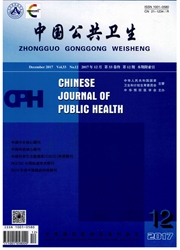

 中文摘要:
中文摘要:
目的探讨高剂量碘与小鼠甲状腺器官特异性免疫疾病的关系。方法采用6组BaLB/c雌性小鼠,分别给予0,1 500,3 000,6 000,12 000及24 000μg/L的碘酸钾,饲养3个月后,测TT4、TT3和促甲状腺激素(TSH)水平;同时取甲状腺作免疫组化分析及病理切片分析。结果高碘可致小鼠弥漫胶质性甲状腺肿,可升高血清TT4、TSH,甲状腺IgG抗体的水平及血清促甲状腺激素受体抗体(TSHRab)的阳性率,降低血清TT3。TT3、TT4、TSH与碘都呈显著剂量-反应关系,甲状腺IgG抗体及TSHRab阳性率水平从6 000μg/L组开始与对照组比较,差异有统计学意义。结论碘6 000μg/L以上碘剂量可诱发以体液免疫为主的小鼠甲状腺自体免疫性疾病。
 英文摘要:
英文摘要:
Objective To investigate relationship between excessive iodine intake and immunolgically mediated disease of mice thyroid organ specificity. Methods BABL/C mice were assigned into 6 groups and given taper water or drinking water including different doses of iodine, The iodine concentrations were, 1500, 3000, 6000, 12000 and 24 000μg/L respectively. Three months later, serum of maternal mice was used for thyroid hormone level determination and thyroid used for histological examination. Results In excessive iodine intake groups, mice showed diffused colloid goiter, Serum TT4、TSH level was significantly higher, and TT3 level lower than control group, thyroid IgG antibody and serum TSHRab significantly higher than normal control group from 6 000μg/L group. Conclusion Excessive iodine intake induces AITD. The threshold level of iodine induced embryo toxicity in this study is 6 000μg/L [0.75 mg/(kg·bw)], This kind of autoimmune reaction prone to humoral immunity.
 同期刊论文项目
同期刊论文项目
 同项目期刊论文
同项目期刊论文
 期刊信息
期刊信息
